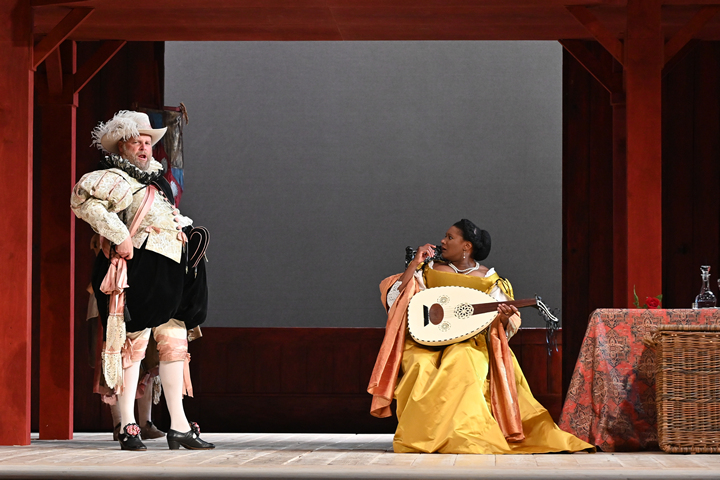| Opera Reviews | 27 April 2024 |
A lively Falstaff deserving of a full houseby Catriona Graham |
|
Verdi: Falstaff
|
|

|
|
|
The Edinburgh International Festival’s opera programme gets off to a great start with Verdi’s rumbunctious comedy Falstaff. It is a good choice in a time of social distancing, with a plotline which hinges on avoiding intimacy. It is based on Shakespeare’s The Merry Wives of Windsor, with borrowings from Henry IV, parts 1 and 2, in an entertaining translation by Amanda Holden. Sir John Falstaff is broke, all his money spent on board, lodging and bar bills for himself and sidekicks Bardolph and Pistol. He decides to play the gigolo and get money from the wives of two rich merchants, only things do not go to plan. We first see Sir John in bed, writing, as the bed is rolled onto the stage. Sir David McVicar’s design of a bare stage with stairs left and right giving access to a landing above, works for the Garter Inn, Mistress Ford’s garden, her house, and Windsor Great Park, where the wooden supports have a satisfyingly tree-like aspect. Round him, chaos erupts as a girl falls out of his bed, his companions lurch around drunkenly and Dr Caius accuses them of theft. The landlord tries to tidy up. Roland Wood is a fine Falstaff – full-bodied and upright with a robust voice, particularly in his polemic about honour. It is never quite clear how self-aware he is or isn’t – does he really believe that Mistress Alice is in love from just seeing her at the window? He has met his match in the quartet of Windsor matrons though, who (of course) share the letters they receive from him. A plus point is that they all sound sufficiently different from each other – a broadcast of another Falstaff production was ruined for me by them all sounding the same. Elizabeth Llewellyn’s voice has a delightful, distinctive tone and she is a decidedly glamorous Alice Ford, in her three richly coloured gowns, as well as smart. With her co-conspirators, Meg (Sioned Gwen Davies), Mistress Quickly (Louise Winter) and Nannetta (Gemma Summerfield), she is more than a match for Sir John – and her own husband. He has been goaded to jealousy by Pistol (Alistair Miles) and Bardolph (Jamie MacDougall, singing in a Scots accent), who are seeking another master now Falstaff is broke. Phillip Rhodes plays the wealthy merchant Ford with blustering self-righteousness, nicely switching to obsequious supplication when masquerading as Master Brook, in love with Alice and seeking Falstaff’s assistance. Like Falstaff, he is gracious in his comeuppance. Nannetta and Fenton (Elgan Llŷr Thomas) make a charming couple, flirting in the fringes of the grown-ups’ plotting. When it comes to the denouement, at Herne’s Oak with strong Midsummer Night’s Dream overtones, Summerfield’s aria as the Queen of the Fairies is magical. The non-singing actors and children fill the stage unsettlingly. Conductor Stuart Stratford and the orchestra keep the music light and tripping along, particularly in the many patter passages. McVicar injects just enough panto without resorting to slapstick - the comedy has potential to be cruel but, despite the indignities perpetrated on the elderly knight, never actually is. It’s a production to see again in the full house it deserves. |
|
Photo © Julie Howden |
|







